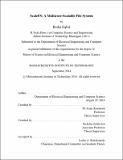| dc.contributor.advisor | M. Frans Kaashoek and Nickolai Zeldovich. | en_US |
| dc.contributor.author | Rasha Eqbal | en_US |
| dc.contributor.other | Massachusetts Institute of Technology. Department of Electrical Engineering and Computer Science. | en_US |
| dc.date.accessioned | 2015-02-05T15:59:01Z | |
| dc.date.available | 2015-02-05T15:59:01Z | |
| dc.date.copyright | 2014 | en_US |
| dc.date.issued | 2014 | en_US |
| dc.identifier.uri | http://hdl.handle.net/1721.1/93781 | |
| dc.description | Thesis: S.M., Massachusetts Institute of Technology, Department of Electrical Engineering and Computer Science, 2014. | en_US |
| dc.description | This electronic version was submitted by the student author. The certified thesis is available in the Institute Archives and Special Collections. | en_US |
| dc.description | Cataloged from student-submitted PDF version of thesis. | en_US |
| dc.description | Includes bibliographical references (pages 47-49). | en_US |
| dc.description.abstract | It is difficult to achieve durability and crash consistency in file systems along with multicore scalability. Commutative file system operations, which should scale according to the Scalable Commutativity Property, conflict on shared resources like coarse-grained locks and pages present in the page cache or buffer cache. Furthermore, data structures that are on separate cache lines in memory (e.g., directory entries) are grouped together when the file system writes them to disk for durability. This grouping results in additional conflicts. This thesis introduces a new design approach that decouples the in-memory file system from the on-disk file system, using per core operation logs. This facilitates the use of highly concurrent data structures for the in-memory representation, which is essential for commutative operations to proceed conflict free and hence scale perfectly. The in-memory representation does not propagate updates to the disk representation immediately, instead it simply logs the operation in a per core logical log. A sync or an fsync call processes these operations and applies them to the disk. Techniques based on time stamping linearization points of file system operations ensure crash consistency, and dependency tracking ensures good disk performance. A prototype file system, SCALEFS, implements this new approach and techniques. Experiments using COMMUTER and SCALEFS show that the implementation is conflict free for 99% of test cases involving commutative operations. | en_US |
| dc.description.statementofresponsibility | by Rasha Eqbal. | en_US |
| dc.format.extent | 49 pages | en_US |
| dc.language.iso | eng | en_US |
| dc.publisher | Massachusetts Institute of Technology | en_US |
| dc.rights | M.I.T. theses are protected by copyright. They may be viewed from this source for any purpose, but reproduction or distribution in any format is prohibited without written permission. See provided URL for inquiries about permission. | en_US |
| dc.rights.uri | http://dspace.mit.edu/handle/1721.1/7582 | en_US |
| dc.subject | Electrical Engineering and Computer Science. | en_US |
| dc.title | ScaleFS : a multicore-scalable file system | en_US |
| dc.title.alternative | Multicore-scalable file system | en_US |
| dc.type | Thesis | en_US |
| dc.description.degree | S.M. | en_US |
| dc.contributor.department | Massachusetts Institute of Technology. Department of Electrical Engineering and Computer Science | |
| dc.identifier.oclc | 901404273 | en_US |
